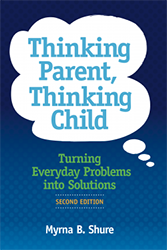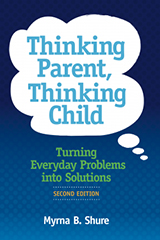Thinking Parent, Thinking Child
Turning Everyday Problems into Solutions
Second Edition
The "I Can Problem Solve" Program
Is your child afraid of school tests? Some kids are, even as early as age five or six. If you see a fearful pattern beginning to emerge, you'll probably want to ask your child why he's afraid. But most likely you'll hear the perennial, "I don't know."
Stay calm. If you're upset about his anxiety, your child will sense it. But don't dismiss his fear, either, by saying, "You'll do fine." Your child will sense a distinct lack of caring about his feelings. It's also important to avoid showing disappointment in a bad grade. Instead of telling your child how you feel about the grade, let your child express how he feels about it.
What you need to do next is determine why he's afraid and what exactly the problem is. Test anxiety can have several different causes, and you can often find the source of the problem if you go over the test with your child.
Some children don't do well on tests and come to fear them. If this is the case, you can try coaching your child in some specific test-taking strategies, such as those described by Joseph Casbarro in his book Test Anxiety and What You Can Do About It. These include looking over the entire test before starting, eliminating choices in a multiple-choice exam that your child knows for sure are incorrect, answering easy items first, and watching the time.
Another possibility is that your child knew the answers and still failed a test, which makes him afraid to try again. Try to determine if your child read the questions too quickly or failed to understand the directions. Many kids misread directions and questions, often from carelessness. If this is the case with your child, have him practice reading more slowly and carefully.
Some children fear tests even when they don't fail. It may be that your child is afraid of making mistakes. If so, let him know that everybody does. Another possibility is that your child may worry about letting you down. He may feel that too much emphasis is placed on achievement or that he receives praise only when he does well. One parent I know criticized her daughter for getting a 98 on a math test. Instead of focusing on the positive score, she questioned her child about what she got wrong.
But the problem may run deeper. Your child may be distracted because she's overscheduled and has too much to do. Many kids these days are trying to do too much, too soon, too fast -- music lessons, dance classes, soccer practice, Girl Scouts -- all in addition to getting their homework done on time. How much can your child take? How much can you take?
The ancient Greeks had a very important belief. "Everything in moderation." This applies to children, too. With your help, children as young as seven can plan their own days. Here's how you can help:
- Make a list of all the activities your child has participated in -- and any new ones she has expressed interest in.
- Ask your child to cross out anything she would or could discontinue.
- Of the remaining activities, ask her to put a star next to those that she must have in her life.
- Let your child plan her time. Include time for homework and that important time to just play with her friends.
- Ask her if she thinks there's time for all the activities in her plan.
After going through this process, most children will see the need to make important choices in life, such as how to decide which activities are of greatest interest to them. If your daughter thinks a different activity once a week for an hour is enough to satisfy her, let her try that. If your son would rather spend time perfecting skills in one area, that's OK, too. What's important is that they made the decision themselves: kids will learn to schedule time for what they have to do and still have time for what they want to do. They are more likely to stick to their own plan -- altering it when necessary to better suit their needs -- than one their parents created.
Balance, moderation, and a plan of their own will help your children feel more in control, better prepared for their tests, and less stressed. And the less stress they're under, the less you'll be under as well.
As Maurice Elias of Rutgers University tells us, "We must prepare our children for the tests of life, not a life of tests." And by doing that, they may actually feel less anxious about the tests they have to take.
Your four-year-old keeps jumping on the couch with his shoes on. You love looking at his happy face; you delight in his exuberance. But you also want him to know that you have feelings, too, and that right now, you're concerned that he'll ruin the sofa cushions. You feel like yelling, "Get off the couch, you'll get it all dirty!" but you also know that yelling doesn't work: your child tunes it out.
Your six-year-old is sitting on the living room rug and finger-painting. You love the fact that she can amuse herself and that she wants to express herself through art. But you've also told her time and time again that she can't paint on the rug, and that wherever she paints, she has to cover the area with newspaper. You have feelings, too. So you sit down with her and explain why you don't want her to paint on the rug. Yet you don't want to squelch her creative energy. You talk. She nods. But you wonder if she heard a word that you said.
What can you do instead? First, assume that your children aren't defying you on purpose. They don't want to dirty the couch cushions or stain your rug with finger paint. They're simply not thinking of you at all. And that's the problem.
Here's how you can involve your child in a conversation that will help him reach his own goals while understanding your point of view:
When a child jumps on the couch, ask, "What might happen if you jump on the couch?"
Some kids might say, "I don't know," or more defiantly, "I don't care."
Try not to get excited, and calmly say, "I know if you think really hard, you can think of something that might happen."
If your child says, "You'll make me go to my room," you can guide him without telling him by asking, "And what could happen if you don't see where you're jumping?" The idea here is for children to recognize why jumping or running inside is not a good idea, rather than to have them react to the external threat of being yelled at or sent to their room.
Now if your child says, "I might get hurt," or, "I might get something dirty," you can ask, "How might you feel about that?" Most children will say, "Sad." Follow that with, "How do you think I will feel if that happens?" Most children will say, "Sad," or "Mad." Finally, ask, "Can you think of a different place to jump [or paint] so that won't happen, and we both won't feel sad or mad?"
When one dad I know asked his four-year-old daughter these questions, she thought of her own solution: that outside would be a good place to jump -- and off she went with a smile on her face. Dad was smiling, too. He recognized his daughter's needs, while she recognized that Dad has feelings, too.
Here's another scenario. Your ten-year-old and seven-year-old are playing tag in the dining room, running for their lives. As they tear through, the vase on the table wobbles and falls to the floor, where it shatters. You're livid. You spank them and send them to their rooms. But that doesn't accomplish very much. Now each boy is angry with the other for getting them both in trouble. They're both mad at you for not understanding that they didn't break the vase on purpose. And you're furious at both of them for being so careless and thoughtless.
If your children actually break something, you can ask the same kinds of questions as above:
"Was the dining room a good place to run?" "What happened when you ran?"
"How do you feel about what happened?" "How do you think I feel about it?"
"Where is a good place to play?"
"What are you going to think about the next time you want to play tag inside the house?"
In this way, children will grow accustomed to factoring your needs into their equation. But the problem won't entirely disappear. Many preteens are still oblivious to anyone's needs other than their own. Here's how another dad helped his preteen daughters see that different people can feel different ways about the same thing, by asking them, "How can this be?"
DAD: Let's make up a story about two girls your age. Alice loves to play music really loud; it makes her feel good. Her sister Mary hears the same music and feels angry. How can this be?
EMILY: Maybe Alice is remembering how loud the music was at the dance at the school last week. She loves to dance to really loud music.
TINA: But if Mary's trying to do her homework, then the music is probably bothering her.
DAD: Good thinking. Now you make up a story like mine.
EMILY: Eve got a soccer ball for her birthday and she felt really happy. Carol got one but she felt scared. Eve loves soccer and Carol is always afraid of getting hit in the head.
TINA: Jackie felt proud because she got the lead in the school play. Cindi didn't even want to try out for the part because she's afraid of forgetting her lines.
Both girls now understand that different people can feel different ways about the same thing. When disagreements arise at home, this dad need only remind his daughters of their stories, and ask, "How can this be?" No more usually needs to be said.
You can also play the "How do people feel about things?" game. Here's how:
Start with a good-feeling word, like happy. Ask your child, "What makes you happy?" Then ask, "What else? Try to think of five things."
After your child has answered, say, "Now tell me what might make your friend Tom feel happy? How about Grandma? What about Dr. Peters?"
When your child answers, say, "Now we're going to make this game a little harder. What might make your friend, Grandma, and Dr. Peters feel happy?" She may say something like, "An ice-cream cone.
Then ask, "What might make Tom feel happy but not Grandma?" Your child may say, "A video game."
"What would make Grandma feel happy but not Tom?" you can ask next.
"A visit to the museum," your child may say.
Next, you can play the game with other feeling words, like sad, angry, disappointed, and worried.
Dialogues like these encourage children to develop the capacity to take their own needs and the needs of others into consideration at the same time and to come up with a mutually agreeable solution. It's one of the best ways we can equip our children for all the relationships they'll develop over the course of their lives.
The homework wars. They erupt in so many households. Parents remind children of their assignments, then nag. Children whine and procrastinate. Many times, it's bedtime and your child's homework is still incomplete, or perhaps not even begun. How do you handle it?
Here's what happened when one mom, Louise, used demands and threats with seven-year-old Darnell.
MOM: Darnell, you've been home from school for nearly an hour and you haven't even begun your homework. No TV and no friends over until it's done.
DARNELL: But Mom, I'll do it!
MOM: We go through this every day. I want it done now. If you don't, you won't get it done at all and your teacher will be angry, and you'll fall behind in school.
The trouble was that Louise was talking at Darnell, not to him. Here's how she learned to involve her son using the problem- solving approach.
MOM: Darnell, what subjects do you have for homework tonight?
DARNELL: Spelling words, math, and science.
MOM: Which do you want to do first?
DARNELL: I guess my words.
MOM: Good. Do you want to work on your words before or after your snack?
DARNELL: After.
MOM: OK -- and what will you do after you finish your words?
DARNELL: Play outside.
MOM: OK -- and will you do your math before or after dinner?
DARNELL: Before.
MOM: And science?
DARNELL: After.
MOM: Darnell, I'm very proud of you. You made your own plan.
This is a good start. Once your child starts thinking of his own plan, as Darnell did, you can ask some additional questions, such as:
"How long do you think your math will take?"
"What will you do if it turns out you need more time?"
"What will you say or do if your friend calls while you're in the middle of your math homework?"
And, if your child is old enough to tell time:
"At what time will you begin the next subject?"
Children as young as seven love to make their own plans. That way, they feel involved in the planning process and committed to the outcome.
Older children need to make plans for more complex tasks. Amelia, age eleven, had a report on a historical event due in two weeks, and it was her style to wait until the night before to begin reading the book. And the more her mother nagged her to start earlier, the more Amelia resisted. Mom tried a different tack by asking these questions:
"When is your report due?"
"How many days do you have to do it?"
"What's the first thing you have to do?"
"How long do you think that will take?"
"Then what do you have to do?"
"How long do you think that will take?"
Dividing more complex tasks into smaller steps, leaving enough time for each step, can help reduce stress and the sense of being overwhelmed. Amelia realized she had to do some research on her topic, chose both the Internet and the library, estimated how long each would take and how long it would take to actually write up her report. Using a calendar, she counted the days she estimated for each step and figured in time for the rest of her homework and other activities. With practice, she got better at all this with each assignment and soon had her short- and long-range projects completed in time to get a good night's sleep before they were due. With a little effort, and guidance from you, your child can get skilled at this, too.
When your child is able to plan his time, whether for short- or long-term projects, he will feel more in control while learning about responsibility, organization, and time management. Not only will he probably enjoy school more, but he can rely on these skills for the rest of his life.
Copyright © 2016 Myrna B. Shure

 by Myrna B. Shure, Ph.D.
by Myrna B. Shure, Ph.D. 
